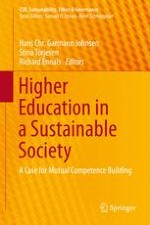
2015 | OriginalPaper | Chapter
1. Higher Education in a Sustainable Society: Addressing Knowledge Disparities and Enabling Debate
Authors : Hans Christian Garmann Johnsen, Stina Torjesen, Richard Ennals
Published in: Higher Education in a Sustainable Society
Publisher: Springer International Publishing
Activate our intelligent search to find suitable subject content or patents.
Select sections of text to find matching patents with Artificial Intelligence. powered by
Select sections of text to find additional relevant content using AI-assisted search. powered by